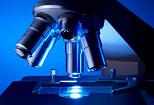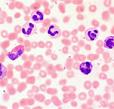Departments – examinations
Biochemical
 The biochemical department studies, with the help of chemical reactions, substances found in the body, thus making useful conclusions about the overall functioning of the body, as well as the functioning of individual organs. Modern, automated biochemical analyzers are used. These methods include:
The biochemical department studies, with the help of chemical reactions, substances found in the body, thus making useful conclusions about the overall functioning of the body, as well as the functioning of individual organs. Modern, automated biochemical analyzers are used. These methods include:
- Chromatography reactions
- Enzyme reactions
- Electro-chemiluminescence
Main tests
Blood Sugar, Glycosylated Hemoglobin (HbA1c), Urea, Creatinine, Uric Acid, Cholesterol, HDL, LDL, Triglycerides, Transaminases (SGOT, SGPT), Alkaline Phosphatase, GTG, CPK, LDH, Albumin, Iron, Ferritin, Vitamin B12, Folic Acid, Homocysteine, TIBC, Electrolytes (K, Na, Ca, P, Mg, Cl).
- Our laboratory specializes in neonatal jaundice since it is possible to accurately measure neonatal bilirubin by taking a small amount of capillary blood from the heel with the help of a specialized analyzer (bilirubinometer).
Microbiological
 Η Microbiology is a branch of Medicine and Biology that focuses on the study of these microorganisms, on their different properties, as well as on their clinical applications. In the Microbiological department, all the basic tests for the detection of microorganisms are carried out.
Η Microbiology is a branch of Medicine and Biology that focuses on the study of these microorganisms, on their different properties, as well as on their clinical applications. In the Microbiological department, all the basic tests for the detection of microorganisms are carried out.
Main tests
Urine culture, sputum, vaginal, cervical or otitis excretion etc. Cultivation and microscopic examination for Tuberculosis Mycobacterium. We perform a sensitivity test (antibiogram), check for Chlamydia, Ureoplasma, Mycoplasma, and search for pests in various materials.
Hematological
 Hematology is a branch of medicine and other biological sciences that focuses on the study of the hematopoietic system, its organs, and more specifically its amorphous and cellular components. In the hematology department, with the help of modern analysts, all routine examinations are carried out to diagnose diseases such as:
Hematology is a branch of medicine and other biological sciences that focuses on the study of the hematopoietic system, its organs, and more specifically its amorphous and cellular components. In the hematology department, with the help of modern analysts, all routine examinations are carried out to diagnose diseases such as:
- Hemolytic anemias - Hemoglobinopathies, e.g. β-Mediterranean anemia, Sickle cell anemia, Cooley disease.
- Hematological malignancies, e.g. leukemia.
- ΠCoagulation disorders, e.g. hemophilia, thrombocytopenia etc.
Main tests
General Blood Test, Erythrocyte Sedimentation Rate (RCC), Reticulocytes (GRE), G-6-PD, Sickling test, Blood type, Rhesus, Coombs (indirect and direct), Check of Coagulation Factors.
Hormonal
 Hormones are the chemical compounds which are produced in a part of the body (e.g. pituitary gland, thyroid gland, endocrine glands, adrenal glands, etc.) and are transported to other distant organs or tissues where they have an impact on. The hormonal effect takes place at the receptors in the target cells, which results in their activation. This activation then leads to changes such as differentiation in the growth, function and metabolism of the cell. The study of the hormones is a key element in being healthy.
Hormones are the chemical compounds which are produced in a part of the body (e.g. pituitary gland, thyroid gland, endocrine glands, adrenal glands, etc.) and are transported to other distant organs or tissues where they have an impact on. The hormonal effect takes place at the receptors in the target cells, which results in their activation. This activation then leads to changes such as differentiation in the growth, function and metabolism of the cell. The study of the hormones is a key element in being healthy.
In the Hormonal Laboratory all hormone-related tests take place by using modern and automated systems and analyzers, such as:
- Thyroid
- Fertility
- Androgens
- Osteoporosis
- Diabetes
- Adrenal glands
- Prenatal control
Main tests
TSH, T3, T4, Free T3, T4 (FT3, FT4), Anti-TPO, Anti-TG, TSI, TBG, TG-thyroglobulin, β-HCG (Chorionic Gonadotropin), Ε2 (Oestradiol), FSH, LH, PRG, PRL, Testosterone, 17-OH-PRG, DHEA, DHEA-S, aldosterone, Cortisol, Down Syndrome risk assessment and other conditions with the PAPP-A determination, FBC in the first trimester and triple test in the second trimester, Anti-Mullerian Hormone (AMH)..
Immunological
 The immune system is a remarkable adaptation mechanism that protects the organism from pathogenic microorganisms and diseases such as malignancies. Immunology is a branch of medical and biological sciences that studies the functions of the immune system under normal and pathological conditions. In the immunological department, through the continuous development and discovery of new immunobiological markers, tests are conducted which lead to the identification of the pathological mechanisms and functions of the immune system diseases. With the help of modern and automated analyzers, even the most specialized immunological examinations can take place straightaway, thus playing a primary role in the clinical diagnosis of diseases such as:
The immune system is a remarkable adaptation mechanism that protects the organism from pathogenic microorganisms and diseases such as malignancies. Immunology is a branch of medical and biological sciences that studies the functions of the immune system under normal and pathological conditions. In the immunological department, through the continuous development and discovery of new immunobiological markers, tests are conducted which lead to the identification of the pathological mechanisms and functions of the immune system diseases. With the help of modern and automated analyzers, even the most specialized immunological examinations can take place straightaway, thus playing a primary role in the clinical diagnosis of diseases such as:
- Immunodeficiencies, e.g. acquired immune deficiency syndrome (AIDS), chronic granulomatosis.
- Autoimmune diseases, e.g. systemic lupus erythematosus, rheumatoid arthritis, Hashimoto's thyroiditis, myasthenia gravis.
- Infectious diseases, e.g. hepatitis, HIV, cytomegalovirus (CMV) infection, toxoplasmosis, rubella.
- Immunodeficiency and cancer.
Main tests
a. Autoimmune Diseases
Antinuclear/ ANA, Anti-ENA, -DNA, Anti SS-A (Ro), SSB (La), Anti-Sm, Anti-CCP (Cyclic Citrullinated Peptide Antibody), ASMA, Immunoglobulins IgA, IgG, IgM, IgD , IgE, Anti-RNP, APCA, c-ANCA, p-ANCA, Anti-SMA, hs-CRP, RA-test, β2-Microglobulin, Supplement C3, C4, C total, Anti-dsDNA, Anti-ss DNA, Anti mitochondrial (AMA), anti-ovarian.
b. Infectious diseases
Hepatitis, Rubella, HIV I/II 4th Generation *, Toxoplasma, Cytomegalovirus (CMV), Herpes (HSV), Helicobacter, Chlamydia, Varicella (VZV), Listeria, Mycoplasma, ASTO, EBV, Measles antibodies, Borrelia, Brucella, Mumps, Anti-Echinococcal Ab.
* With the 4th generation HIV / BioMerieux reagents used by our laboratory, it is possible to diagnose the infection only 3 weeks after contact with the virus.
Allergy Tests
In our lab we measure the specific IgE which are responsible for allergies, thus identifying the cause of the symptoms. We also measure total IgE and tryptase. The above tests are performed with the ImmunoCAP reference method on the Phadia UniCAP 100 analyzer.
Oncological
In this department, take place examinations which help diagnose cancer with the use of the most up-to-date methods of testing. These diagnostic methods include blood tests and, more specifically, specific cancer markers. These markers help to discover and diagnose certain types of cancer in the course of their treatment, as well as in the pathological diagnosis of certain diseases.
Main tests
A-FP, CEA, CA 19-9, CA 15-3, CA 125, CA 50, CA 72-4, NSE, MCA, SCC, TPA, TPS, PSA, PAP, FPSA, FPSA/ TPSA.
Serological
In this department take place all the blood tests that deal with the analysis of blood serum. In the laboratory, the serotonin test focuses on the detection of serum antibodies. These antibodies are primarily produced in response to a microbial or bacterial infection (e.g., ASTO), against other proteins “foreign” to the organism (e.g. in transfusions), or against the organism's own proteins (e.g. Autoimmune Diseases).
Main tests
Qualitative CRP, RA-Test, VIDAL, WRIGHT, VDRL, Mono-Test, LE Test, RPR, STREP-A-test.
Department of Fertility
 In our lab the spermogram test takes place according to the latest World Health Organisation guidelines. Many fertility related tests have been mentioned in the above sections, such as hormones, cultures, immunological tests etc.
In our lab the spermogram test takes place according to the latest World Health Organisation guidelines. Many fertility related tests have been mentioned in the above sections, such as hormones, cultures, immunological tests etc.